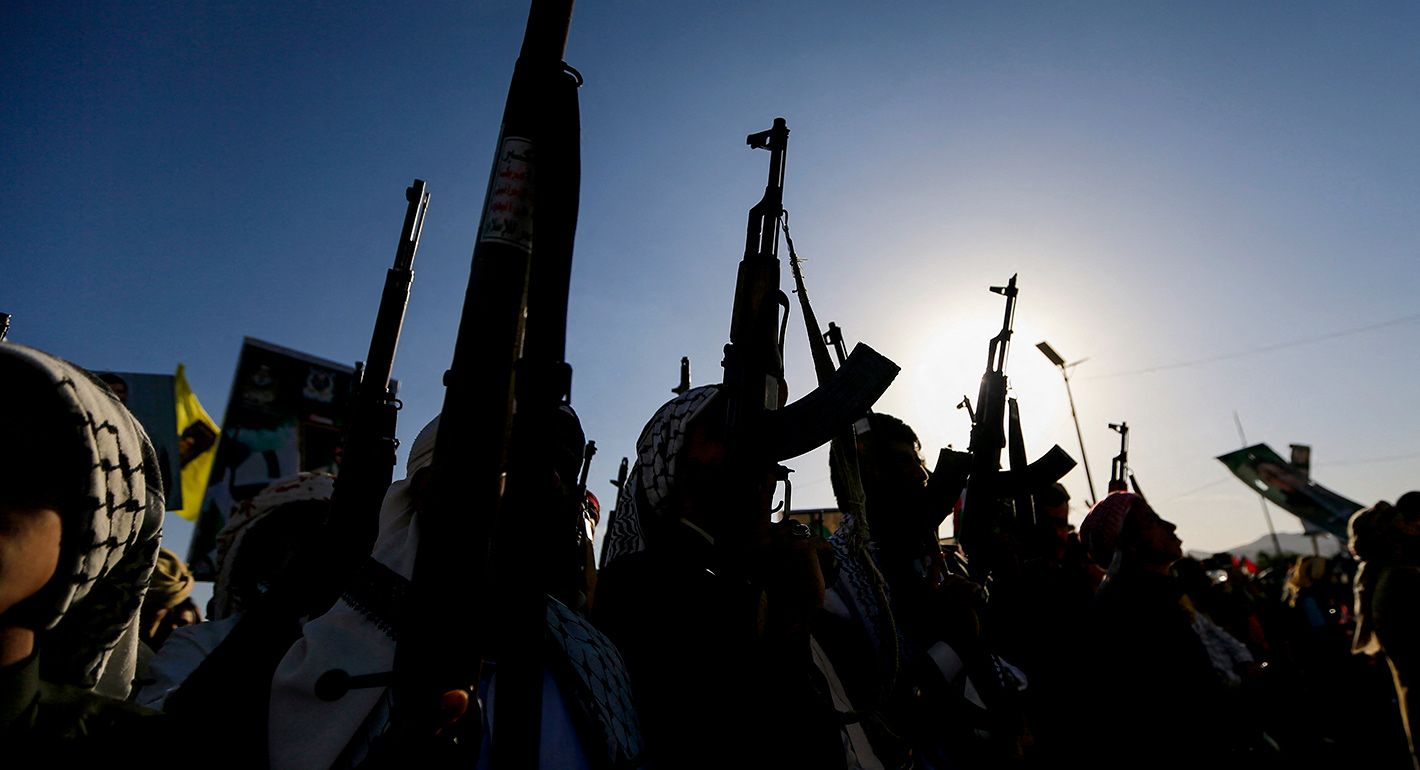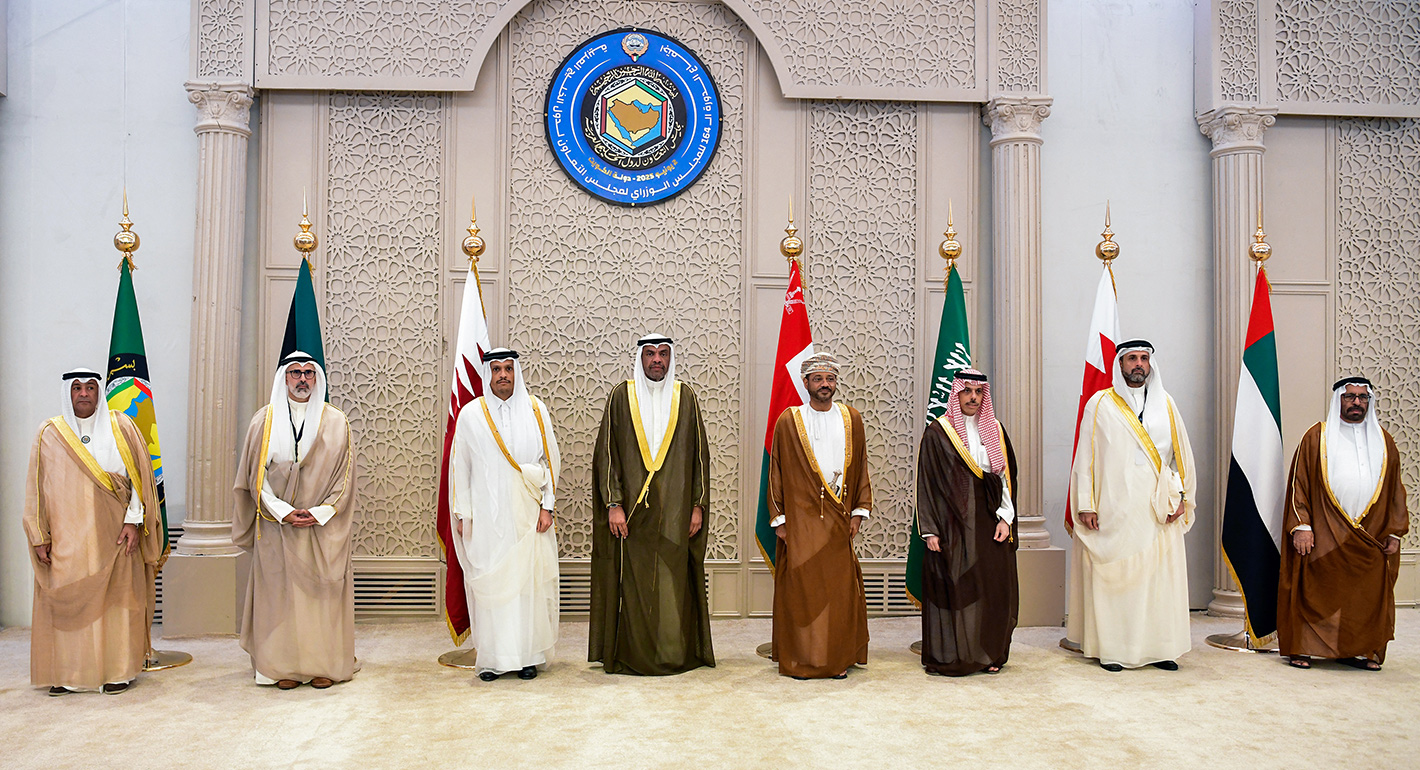Past peace processes in Israel and Palestine showed what makes negotiations work. This time, Arab governments are uniquely positioned to broker a lasting peace.

Source: Getty
How Regional Security Dialogues Can Address the Grim Realities in the Middle East
Faced with multiple complex conflicts, Arab states need to develop mechanisms of collective action that are not available to them today.
The states—and the peoples—of the Middle East are experiencing a critical moment of instability and insecurity without the diplomatic tools to address or even manage them. Can Arab states help forge some of those tools? History would lead us to be skeptical of anything more than limited coordination. But shifts at the global level (especially the role of the United States) and at the regional level (with key actors seeking dominance in unsettling ways) create both greater opportunities and greater needs.
The Regional Challenge
The period from the outbreak of the Gaza war in October 2023 to the present day has demonstrated the regional and international inability to resolve wars and conflicts peacefully. It has also led to an unprecedented expansion in the use of military force in various areas in the Middle East, with a dangerous increase in international arms sales to the states of the region, threatening even greater escalation. Today’s conflicts do not promise clear outcomes but evolving forms of ongoing violence. The continued, unresolved nature of some of the major conflicts in the region augurs permanent strife and more associated bloodshed and destruction.
And the result will likely serve nobody’s interests. The Gaza war continues to this day because the collective trauma caused by Hamas’s attacks on October 7, 2023, continues to take hold of Israeli politics and popular sentiments as well as because of the denial of the individual and national rights of Palestinians—a denial that fostered conducive conditions for the current conflagration. The ongoing violence is undermining any hope of reaching an agreement on an acceptable vision for governing the affairs of Gaza, the West Bank, and East Jerusalem, a vision that guarantees the security of Israelis and some form of national self-determination for the Palestinian people.
The regional expansion of the Gaza war to other areas in the Middle East—to Lebanon, Syria, Iraq, Iran, and Yemen—is linked to Iran’s activities tailored to use its allied nonstate actors such as Hezbollah in Lebanon and Ansar Allah (also known as the Houthis) in Yemen to attack Israel. In the past decades, Iran, by means of supplying its allies with arms, has surrounded Israel with an arsenal of missiles and drones capable of threatening its security and undermining the safety of civilians—especially in the northern regions that border Lebanon. But the regional expansion of war is also linked to Israel’s permanent readiness to deploy its military might to strike its enemies. The result of both is a Middle East crowded with armed militias and engulfed by protracted wars, military operations, and an out-of-control arms race.
The Failures of Diplomacy
The Middle East is virtually the only region in the world that does not have standing multilateral bodies designed for diplomacy, conflict prevention, and the coordination of security. Most other regions have inclusive regional structures of some sort; even during the Cold War in the second half of the twentieth century, there were structures for communication between the leading blocs. In the Middle East, such structures cannot be built because key actors refuse to deal with each other. This means that for each conflict—such as in Gaza, Lebanon, Syria, Yemen, Libya, and Sudan—ad hoc structures with limited effectiveness have to be jerry-rigged.
There is no Middle Eastern equivalent to the Organization for Security and Co-operation in Europe. Joint defense arrangements between member states of the Arab League are restricted to those states and have been largely ineffective in preventing conflicts or containing regional wars, even among Arab countries: The Iraqi invasion of Kuwait in 1990 is an old case in point; a more recent case is the ongoing border conflict between Lebanon and Syria.
The non-Arab states of the Middle East—Israel, Iran, and Türkiye—have made past attempts at collective security arrangements. But such attempts either failed, such as the Baghdad Pact in the 1950s, or fluctuated due to radical shifts in domestic politics and popular sentiments—for example, the Islamic Revolution in Iran in 1979 ended the long-standing coordination of security between Mohammad Reza Pahlavi’s regime and Israel. The ascendancy of Islamists to political power in Türkiye since the early 2000s and the assertion of their control over foreign and defense policies have replaced cooperation between Türkiye and Israel with contention. Also, Iran and Türkiye have been long engaged in a race for spheres of influence in Syria and Iraq, which in recent years has resulted in tensions between the two countries.
For over a century, whatever regional coordination was achieved took place in the context of the domination of an external power (such as the United Kingdom and the United States) or sometimes a rivalry among global powers (especially during the Cold War). Such arrangements hardly resolved regional conflicts, and many within the Middle East felt that they both protected and deeply aggravated existing injustices and inequalities. They also seemed to preclude alternative multilateral arrangements from arising.
In recent years the United States has simply shown no interest in a pax Americana—it is very active in the region to be sure, but is hardly pursuing anything that most states and peoples would recognize as peace and is generally driven by pugnacious understandings of its own national interests combined with alignments with specific favorite partners and attempts to pressure those favorites to work together. Whatever consistency that general approach offers is undermined by mercurial U.S. behavior stemming from domestic instability and polarization.
In the current global moment, in which the United States is currently less invested in peacemaking and other great powers are either weary of stronger involvement in regional affairs (as China is) or drained due to their involvement in wars raging elsewhere (as the European Union and Russia are), the need for multilateral conflict prevention and coordination of security between the states of the Middle East could not be more immediate.
But despite this crucial need, the limited effectiveness of multilateral diplomacy and collective action in the Middle East has become painfully evident since the outbreak of the Gaza war. Mediators between Israel and Hamas, most specifically Egypt and Qatar, have been unable to extend the ceasefire arrangements beyond the two months of January and February 2025, once U.S. President Donald J. Trump’s administration withdrew the diplomatic and security support for the two countries’ efforts that Joe Biden’s administration had previously offered. The United States worked successfully with Egypt and Qatar to negotiate the ceasefire agreement and advanced to become its guarantor. However, when Israel balked at the implementation, the United States abandoned its own agreement.
To be sure, there is one regional structure with history and staying power, the League of Arab States. The organization does not pretend to extend to the entire Middle East. It offers the possibility of multilateral diplomacy and greater security coordination.
However, there have been two flaws with past attempts to develop a strong Arab stance on regional conflicts either through the Arab League or alongside it. First, it has been difficult to articulate a unified Arab policy, even when diplomatic positions would seem to be close enough to do so. By and large, the result has been separate and only loosely coordinated actions that are easy for other regional states and international powers to bypass, ignore, or pry apart. Coordinated actions among Arabs as key regional actors in the Middle East should have been greater than the sum of its parts. This has hardly happened.
Second, whatever unified policies have been hammered out by the Arab League, they have not been accompanied by assertive diplomatic strategies. The Damascus Declaration, which Syria, Egypt, and the states of the Gulf Cooperation Council issued after the liberation of Kuwait in 1991 and which adopted collective security arrangements between the signatories, quickly petered out when Gulf governments favored bilateral defense agreements with the United States. The most promising joint Arab policy in recent decades may be the Arab Peace Initiative, announced in 2002. The initiative, which all member states of the Arab League endorsed, was bold and offered real opportunities for a more peaceful Middle East. However, when it was ignored by Israel and effectively deflected by the first George W. Bush administration (2000–2004), it remained a source of diplomatic talking points rather than a coherent and forceful policy proposal.
A Desperate Need
The fact that the Middle East has lacked multilateral diplomacy and security coordination for conflict prevention and resolution has created a long-term dependency in the region on ad hoc international efforts to negotiate ceasefire arrangements and peaceful settlements to end both ongoing wars between states and military confrontations between states and armed nonstate actors. In many incidents, those efforts have failed to create the conditions for lasting peaceful settlements.
For peacemaking efforts to succeed, they must be pursued by international powers with resolve and persistence. Some British and American policies in the first half of the twentieth century succeeded—such as armistice agreements between the Israeli and Palestinian parties of the 1948 war that were mostly upheld until the 1967 war broke out. In the second half of the century, a few U.S.-led initiatives held—including successful mediation in peace negotiations between Israel and Egypt in the 1970s and between Israel and Jordan in the 1990s, as well as the less successful U.S. involvement in the Oslo Process between Israelis and Palestinians. But beyond these few examples, international powers have frequently backed away from negotiating peace agreements in the Middle East or have grown reluctant over time to invest their diplomatic and political tools for their implementation in good faith.
Also, international efforts at peacemaking in the Middle East have mostly taken place in an environment in which key regional actors have been quite literally unwilling to negotiate with each other—or even to recognize the existence of one another. Today’s situation is still more difficult. Three neighbors of the Arab world, Israel, Iran, and Türkiye, are not only rivals that are each implementing policies that undermine regional stability and security. But they are also each seeking some form of regional hegemony.
The trilateral rivalry between Israel, Iran, and Türkiye has been taking very dangerous forms, and has led to bouts of open warfare in different areas in the Middle East. Even when these states—and their nonstate allies—have shown some restraint, the peoples of many countries in the region have paid a heavy price. And that may be the case not only for Palestinians, Lebanese, Syrians, Yemenis, Libyans, and Sudanese but also for Israelis, whose government appears currently to be the most dominant Middle Eastern power. The current Israeli leadership’s approach offers a tantalizing prospect of regional hegemony that actually carries profound risks for the country’s future.
Today’s Israeli leaders are simply not interested in dealing with Palestinians as a national community—rather, as individual, and perhaps unwelcome, inhabitants of territory their state controls. Israeli leaders have reacted with a mixture of coolness and hostility to any regional or international diplomatic initiative that treats Palestinians as a national community or that involves their internationally recognized representatives, the Palestine Liberation Organization and the Palestinian Authority. The position of Israeli leaders is consistent and insistent in this regard.
And at present, the justification for that approach has some broad resonance in Israeli society. Even before October 7, 2023, the idea of an accommodation between Zionism and Palestinian nationalism had become increasingly elusive in the minds of many of those who had hoped for it earlier. The collective trauma of the October 7 attacks has left little room for those political parties and organizations arguing for anything that sounds like a two-state solution.
However, this does not mean that there is no debate in Israel. Many of the pillars of the security establishment and much of the center of the Israeli political spectrum have long-term worries about the country’s current course. Such worries have a solid basis.
Two years ago, all of Israel’s borders were calm: There were peace treaties with Egypt and Jordan; the borders with Lebanon saw only a few skirmishes; Israel and Syria had a demilitarized zone that had been undisturbed for half a century, and Israel’s annexation of Syrian territory—the Golan Heights—was a matter far down on any actor’s agenda; the security coordination with the police forces of the Palestinian Authority in the West Bank was shaky but surviving; and a tense modus vivendi prevailed with Gaza.
Today the Egyptian and Jordanian leaderships feel pressured not simply by domestic public opinion but also by the prospect that Israel’s refusal to accommodate Palestinian nationalism will be addressed at their expense through expulsions—a threat that both pro-government and independent commentators deem existential for both countries. Israelis who celebrated their government’s withdrawals from Gaza and Lebanon in the early 2000s—and the knowledge that their children would not face the prospect of military service serving in those places—now are told by their leaders that they themselves will need to return to service, indefinitely. The deterioration of the security and political situation in the West Bank has left the Israeli settler movement sensing triumph—and much of the rest of Israeli society sensing insurgency. The demilitarized zone with Syria has been removed, the long-term freeze of military operations in the areas bordering the occupied Golan Heights has been replaced by daily attacks that geographically reach as far as Damascus, and Israeli forces now have an open-ended commitment that is sure to be challenged by whatever forces come to dominate Syria. No less destabilizing is the fact that the Israeli leadership’s views on Syria seem to sponsor the formal or informal partition of that country.
Arab States as Regional Peacemakers?
Leading Arab states can blaze a different path: to work together in a multilateral, active, and coordinated manner. In the long run, Middle Eastern states will benefit from a permanent body focused on regional security. But in the next few months and years, to address the concerns of Palestinians and Israelis, Arab states can take unprecedented steps—devising mechanisms to put aside short-term rivalries for long-term regional reconstruction; forging a common strategy; presenting meaningful alternatives to Israelis and Palestinians; and articulating conflict prevention and containment policies tailored to incentivize a change of the foreign policy behavior, not only of Israel but also of Iran and to a lesser extent Türkiye—and even then, such steps will not work any magic overnight.
To be successful, an effort will have to be sustained, likely in a formal way. We suggest something like a Damascus Declaration coalition that is aimed at advancing the long-term security interests of Arab states and their neighbors in the Middle East in a way that can engage with—but not depend on—international powers.
This suggestion is not a substitute for a structure for a regional security dialogue. But a coordinated Arab approach might allow for such a structure to emerge from a regional initiative rather than being pushed by outside actors with short-term problems they wish to manage or a specific adversary or ally they are concerned with.
An alignment of Arab governments is bound to focus on regional security. But what about debates about internal governance—ones that have divided the region, and many individual countries, since 2011? Some might think any regional alignment of Arab governments would require them to bury hopes for more accountable political authority and better governance standards within each country. We do not think this should be the case.
Matters of political reform, governance, accountability, and human rights matter deeply, but they are not ones that regional action has ever been able to address. Just the opposite has been the case. Even before 2011, cross-border meddling has led to state decay or collapse—in Lebanon, Syria, Iraq, Yemen, and Sudan. The alignment we suggest can be supportive of processes for Palestinians in the occupied territories and for structures that better protect national and citizens’ rights in some decayed states. For the rest of the region, the past decade and a half suggests that if social, political, and economic justice is to be furthered within Arab countries, then it is unlikely to be through regional action.
The two periods in which Arab governments felt moved to involve themselves in the domestic politics and state-society relations of other countries—the late 1950s and early 1960s and the years after 2011—led to more instability and disorder than democracy and good governance. State sovereignty is a concept that lends itself easily to misuse, but the stability nation-state institutions can provide might be seen as a necessary—if woefully insufficient—prerequisite for positive domestic political change.
But the main promise of such a path lies in what it could deliver in regional security. In today’s regional and international environment, Arab countries face numerous security threats that they must address together, and through diplomatic means, negotiated proposals, peaceful solutions, and multilateral arrangements.
Israel is returning to military escalation in Gaza, preventing the entry of humanitarian aid and equipment needed for reconstruction. The promotion of mass displacement plans of more than 2 million Palestinians is also on the rise, amid a mixture of encouragement and indifference from the current U.S. administration.
But common action among Arab states is difficult. The problem is not a fundamental clash of national interests—while there are different emphases and priorities, all would agree on a shared vision of a Middle East in which borders are respected, neighbors are turned back in efforts to dominate the region, and commerce and finance are secure. And with regard to all matters Israel and Palestine, the content of the Arab Peace Initiative 2002 would still unite them, even if the “initiative” part of that phrase long ago lost momentum.
But key Arab states bring different assets and understandings—ones that often leave them suspicious and more inclined toward rivalry than joint strategizing. Any idea of complementarity takes a back seat to such rivalries. As a result, all Arab countries lose in terms of their regional interests. The lack of common actions among them leaves wide openings for those regional and international actors with very different conceptions of the appropriate Middle Eastern order—conceptions that seem disorderly and profoundly dangerous to Arab states.
There are individual initiatives that promise a more coordinated and complementary Arab approach. Egypt convened a group to mobilize regional and international support for the Gaza reconstruction plan adopted by the emergency Arab League summit a few weeks ago. Egypt is also moving, in partnership with Qatar, to renew ceasefire negotiations between Israel and Hamas and to resolve how to govern Gaza without Hamas, as well as the issue of disarming it. In close coordination with the Palestinian Authority, Arabs are individually and collectively alerting the international community to the escalating violence in the West Bank and the imminent danger of mass displacement of Palestinians from there as well.
Furthermore, on some topics, unity is on display. Egypt and Jordan are decrying the negative repercussions of the current policies and actions of Israeli Prime Minister Benjamin Netanyahu’s government in the occupied Palestinian territories on the peace treaties between the two countries and Israel, and are reiterating their categorical rejection of all displacement plans. Meanwhile, Saudi Arabia is emphasizing its rejection of normalization with Israel before the establishment of an independent Palestinian state and its alignment with the Palestinian and Arab consensus on this matter.
Cairo, Amman, and Riyadh are aware that these positions may not result in a change in Tel Aviv’s violent policies and may result in pressure from Washington to force them either to abandon their opposition to displacement, in the case of Egypt and Jordan, or, in the case of Saudi Arabia, to accept normalization without implementing the principle of Palestinian land and statehood in exchange for peace with Israel.
These alignments are a good start. But the task is not only to pursue diplomatic initiatives tailored to contain the ongoing escalation in the Palestinian territories—and in Lebanon and Syria for this matter—but to take a longer-term outlook on Israel, appealing more to the society than to the current leadership, and presenting a peaceful regional order as an alternative to the expansive use of military capabilities and to the dangerous quest for regional hegemony. The Arab goal should not be to bring down the Israeli leadership—that would be a pointless and likely futile task. Instead, it is to present a strong and viable vision to Israeli citizens less inclined to a pugnacious view of their future: a vision of a peaceful Middle East that offers something other than a forever war of attrition at multiple fronts.
Any regional initiative also has to offer a real alternative to Palestinians and their national rights—rather than simply treating their governance as a technocratic issue of service delivery and policing. Blueprints for Palestinian reform will fail if they focus only on better accounting practices and training programs for police forces; they must be part of a process that offers Palestinians some form of national self-determination. Promises of an eventual state lack all credibility at this point; commitments will have to be more than rhetorical and tied to a clear path toward Palestinian statehood.
And that will mean taking Palestinians seriously as a people with politics rather than personalities. When external actors each select their favorite individual or actor, the fragmentation of Palestinian politics is aggravated, not overcome. Some form of reconstitution of the Palestinian national movement is required, and it is possible for such a movement to be led by the Palestine Liberation Organization.
But all this pertains to only one of the Middle East’s many challenges. What about the others in Lebanon, Syria, Yemen, and elsewhere? What can be done to end ongoing wars and prevent conflicts in the future?
From Gaza to the Region
Arabs also face complex security threats in Lebanon and Syria, where Israel continues its military strikes. The result in both Arab countries is escalating violence and instability, both of which undermine the chances of building the internal consensus necessary for political and institutional reform that can allow Lebanon to overcome sectarian conflicts and the subordination of national decisions to external parties, and enable Syria to promote peaceful coexistence among its diverse groups and rebuild state institutions with a unifying national identity after decades of dictatorship and years of civil war.
Here too, in their individual wills and collective desire, Arab states have no choice other than common diplomatic and peaceful action to consolidate the current ceasefire agreement in Lebanon. Regarding Syria, Arab leaders must not only require that the new government in Damascus launches an inclusive political process and abides by the standards of the rule of law to ensure equal citizenship rights for all Syrians, but they must also demand that the international community takes real action to deter Israel. International powers have by and large ignored the repeated Israeli attacks on Syria, the systematic annexation of more territories bordering the occupied Golan Heights and the demilitarized zone, and the inciting fragmentation under the pretext of protecting the Druze minority.
On the other hand, Iranian policies in the Middle East, with the structural reliance on arming Shia allies to threaten Israel and U.S. interests, pose a direct security challenge to Arab states and their visions of a peaceful and stable region. The expansion of the Gaza war to different areas in the Middle East cannot be understood by unilaterally pointing to Israeli policies and actions and ignoring Iran’s role in arming groups such as Hezbollah in Lebanon, the Popular Mobilization Forces (PMF) in Iraq, and the Houthis in Yemen and creating incentives for them to engage in military action.
Arab security interests are also not immune to the negative impact of the Houthi military operations in the Red Sea, which have undermined maritime security in this vital waterway for Egypt, Sudan, Saudi Arabia, and Jordan. They have also severely reduced global trade through the Suez Canal, resulting in a sizable decline in Egyptian revenues from the canal.
The conflict between Iran, Israel, and the United States has many components: the Iranian nuclear program, Iran’s missile and drone capabilities, and the impacts of U.S. sanctions on domestic social and economic realities in the Islamic Republic. The ongoing tensions have long threatened the prospects for stability and peace in the Gulf and led the states of the Gulf Cooperation Council to increase their military spending and to seek security guarantees from international powers that have their own interests and demands—most notably the United States.
The Tools to be Forged
Faced with all these conflicts, Arab states need to develop mechanisms of collective action that are not available to them today. A standing and sustained arrangement following the precedent of the Damascus Declaration can replace ad hoc and short-term agreements. Arab leaders need to engage with their neighbors in a dialogue about regional security that can emerge by a joint Arab push for it. Conflict prevention and containment, questions of war and peace, as well as ending the current arms race and abolishing weapons of mass destruction are all issues that can be discussed in dialogue forums and that do not take away from the centrality of offering the Palestinian people a national perspective and making a peace offer to the Israeli society.
About the Authors

Director, Middle East Program
Amr Hamzawy is a senior fellow and the director of the Carnegie Middle East Program. His research and writings focus on governance in the Middle East and North Africa, social vulnerability, and the different roles of governments and civil societies in the region.

Nonresident Senior Fellow, Middle East Program
Nathan J. Brown, a professor of political science and international affairs at George Washington University, is a distinguished scholar and author of nine books on Arab politics and governance, as well as editor of five books.
More Work from Carnegie Endowment for International Peace
- How Far Can Russian Arms Help Iran?Commentary
Arms supplies from Russia to Iran will not only continue, but could grow significantly if Russia gets the opportunity.
Nikita Smagin
- Is a Conflict-Ending Solution Even Possible in Ukraine?Commentary
On the fourth anniversary of Russia’s full-scale invasion, Carnegie experts discuss the war’s impacts and what might come next.
- +1
Eric Ciaramella, Aaron David Miller, Alexandra Prokopenko, …
- Can the Disparate Threads of Ukraine Peace Talks Be Woven Together?Commentary
Putin is stalling, waiting for a breakthrough on the front lines or a grand bargain in which Trump will give him something more than Ukraine in exchange for concessions on Ukraine. And if that doesn’t happen, the conflict could be expanded beyond Ukraine.
Alexander Baunov
- Trump’s State of the Union Was as Light on Foreign Policy as He Is on StrategyCommentary
The speech addressed Iran but said little about Ukraine, China, Gaza, or other global sources of tension.
Aaron David Miller
- Can the Gulf Cooperation Council Transcend Its Divisions?Article
Without structural reform, the organization, which is racked by internal rivalries, risks sliding into irrelevance.
Hesham Alghannam











